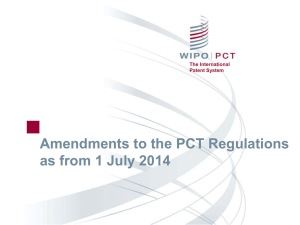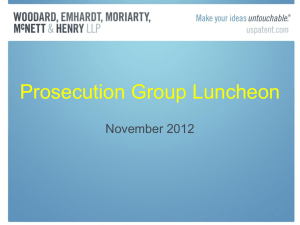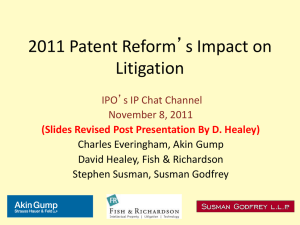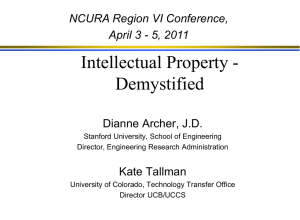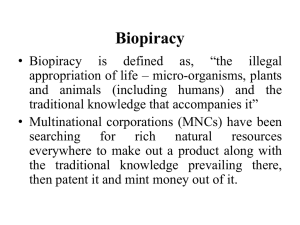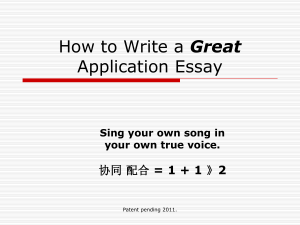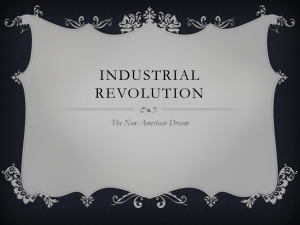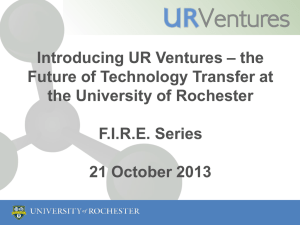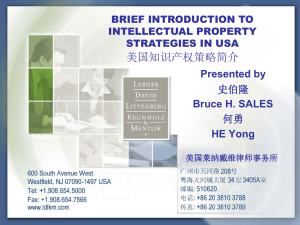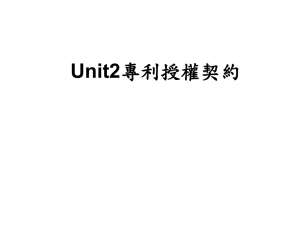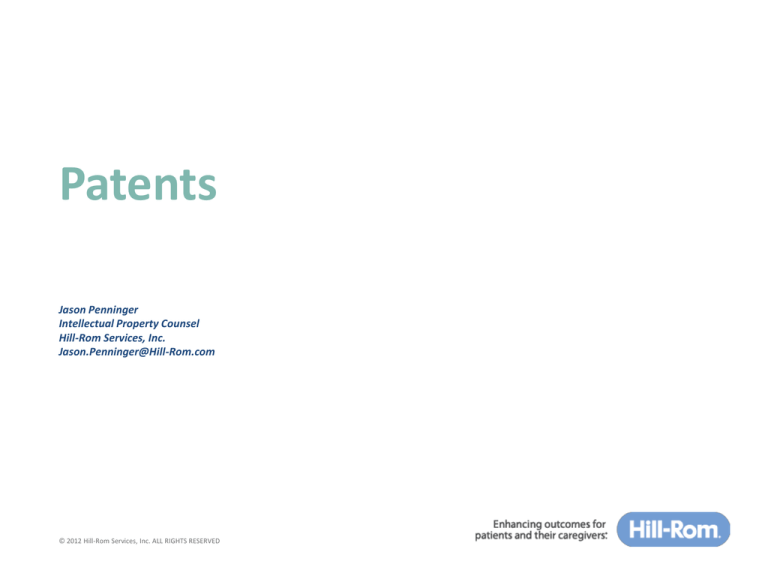
Patents
Jason Penninger
Intellectual Property Counsel
Hill-Rom Services, Inc.
Jason.Penninger@Hill-Rom.com
© 2012 Hill-Rom Services, Inc. ALL RIGHTS RESERVED
Agenda
•
•
•
•
•
•
What is a Patent?
Assignment of patent rights
Ownership and Employees
Joint Ownership
Patent licensing
Hypotheticals
Page 1
© 2012 Hill-Rom Services, Inc. ALL RIGHTS RESERVED
WHAT IS A PATENT?
• A patent is a property right granted by the government to an inventor “to
exclude others from making, using, offering for sale, or selling the
invention throughout the United States or importing the invention into the
United States” for a limited time in exchange for public disclosure of the
invention when the patent is granted.
• The owner of a patent can:
– License the patent to collect royalties
– Sell the patent
– Sue an infringer
– Manufacture, offer for sale, sell , use or import a product covered by
the patent without infringing the patent
• Inventors may not be owners, but owners may be inventors (except where
the owner is a company, which can not be an inventor)
Page 2
© 2012 Hill-Rom Services, Inc. ALL RIGHTS RESERVED
ASSIGNMENT
•
35 U.S.C. 261 Ownership; assignment.
– Subject to the provisions of this title, patents shall have the attributes of
personal property.
– Applications for patent, patents, or any interest therein, shall be assignable in
law by an instrument in writing. The applicant, patentee, or his assigns or
legal representatives may in like manner grant and convey an exclusive right
under his application for patent, or patents, to the whole or any specified part
of the United States.
– A certificate of acknowledgment under the hand and official seal of a person
authorized to administer oaths within the United States, or, in a foreign
country, of a diplomatic or consular officer of the United States or an officer
authorized to administer oaths whose authority is proved by a certificate of a
diplomatic or consular officer of the United States, or apostille of an official
designated by a foreign country which, by treaty or convention, accords like
effect to apostilles of designated officials in the United States, shall be prima
facie evidence of the execution of an assignment, grant, or conveyance of a
patent or application for patent.
– An assignment, grant, or conveyance shall be void as against any subsequent
purchaser or mortgagee for valuable consideration, without notice, unless it
is recorded in the Patent and Trademark Office within three months from its
date or prior to the date of such subsequent purchase or mortgage.
Page 3
© 2012 Hill-Rom Services, Inc. ALL RIGHTS RESERVED
ASSIGNMENT
• Patent ownership is generally a state law question. However, “the
question of whether contractual language effects a present assignment…
or an agreement to assign rights in the future, is resolved by Federal
Circuit law. Company of Trs. of Leland Stanford Junior Univ. v. Roche
Molecular Sys., 583 F.3d 832, 841 (Fed. Cir. 2009), aff’d 131 S.Ct. 2188
(2011).
• The contract language ‘agree to assign’ reflects a mere promise to assign
rights in the future, not an immediate transfer of rights.” Id.
• “If the contract expressly conveys rights in future inventions, no further
act is required once an invention comes into being, and the transfer of
title occurs by operation of law.” Abraxis Bioscience, Inc. v. Navinta LLC,
625 F.3d 1359, 1364 (Fed. Cir. 2010).
Page 4
© 2012 Hill-Rom Services, Inc. ALL RIGHTS RESERVED
ASSIGNMENT
• Practice tips:
– Include language requiring the assignor to help with the execution of
documents.
– Designate Canada specifically. Canada wants the assigning instrument
to be specific to them.
– Notarization is self-proving, but, in the absence, two witnesses can
help with confirming the assignment.
– An assignment does not have to be notarized to be recorded and used
for the notice function. However, it may present issues in later
litigation.
– Remember that for terminal disclaimers, the ownership has to be
common for the life of the disclaiming patent. This needs to be
thought through carefully if the disclaiming patent is not a direct
descendent of the patent to whose term it is tied. If they are in
different families, they may be sold, or wish to be sold, independently.
Page 5
© 2012 Hill-Rom Services, Inc. ALL RIGHTS RESERVED
ASSIGNMENT
• Sample assignment language:
– The undersigned hereby sell(s), assign(s), and set(s) over to:
___________ (hereinafter designated as the Assignee) their entire
right, title, and interest in, to, and under the Application, including all
priority rights for other countries arising therefrom, all inventions
therein disclosed, and any and all Letters Patent of the United States
and of all other countries, including Canada, which may be granted for
such inventions, or any of them, all such inventions and all rights in
such Application and Letters Patent to be held and enjoyed by
Assignee for its own use and enjoyment to the full end of the term or
terms for which such Letters Patent may be granted, as fully and
entirely as the same would have been held and enjoyed by them had
this assignment and sale not been made.
Page 6
© 2012 Hill-Rom Services, Inc. ALL RIGHTS RESERVED
EMPLOYEES
• The best way to address employee inventions is with a well drafted
employment agreement that establishes that employees agree to assign
any and all inventions that they develop during their employment.
• In situations where no employment agreement is entered into, the
employee will usually be the owner of the invention.
– A Company may, if equity dictates, acquire a ‘shop right’ in an
invention by an employee. This is a factual analysis that include a
review of the circumstances surrounding the development of the
invention. McElmurry v. Arkansa Power & Light Co., 995 F.2d 1576,
1580 (Fed. Cir. 1993).
Page 7
© 2012 Hill-Rom Services, Inc. ALL RIGHTS RESERVED
EMPLOYEES
• Sample employment agreement clauses:
– Disclosure: The Employee will promptly disclose in writing to the
Company complete information concerning each and every invention,
discovery, improvement, device, design, apparatus, practice, process,
software or computer program, method or product, whether or not
patentable or copyrightable, made, developed, perfected, devised,
conceived or first reduced to practice by the Employee, either solely or
in collaboration with others, during Employee’s employment under
this Agreement, or for the period in which a covenant not to compete
is in effect hereunder as to Employee, whether or not during regular
working hours, relating either directly or indirectly to the business,
products or practices of the Company or its subsidiaries (hereinafter
referred to as the “Inventions” and each, an “Invention”).
Page 8
© 2012 Hill-Rom Services, Inc. ALL RIGHTS RESERVED
EMPLOYEES
– Employee agrees that any Invention that is or has already been
conceived, devised, made, developed, reduced to practice or
perfected by Employee, alone or with others, during Employee’s
employment by the Company, whether or not in the course of
employment, shall be promptly disclosed in writing by Employee to
the Company. As to any future Inventions made by the Employee
which relate solely to the business, products or practices of the
Company or its subsidiaries and which are first conceived or reduced
to practice during the Term, or for the period in which a covenant not
to compete is in effect hereunder as to Employee, but which are
claimed for any reason to belong to an entity or person other than the
Company or its subsidiaries, the Employee will promptly disclose the
same in writing to the Company and shall not disclose the same to
others if the Company, within twenty (20) days thereafter, shall claim
ownership of such Inventions under the terms of this Agreement.
Page 9
© 2012 Hill-Rom Services, Inc. ALL RIGHTS RESERVED
EMPLOYEES
– Assignment and Assistance: Employee agrees to assign the sole
ownership and to assist and cooperate fully with the Company to
secure and/or enforce any trade name, patent, trademark, copyright,
or intellectual property protection or other similar rights in the United
States and/or in foreign countries, including without limitation, the
execution and delivery of assignments, patent applications and other
documents at the Company’s reasonable request, whether during or
at any time after Employees employment with the Company. If such
assistance is requested after the conclusion of Employees
employment, the Company shall compensate Employee at a
reasonable rate for the time actually spent by Employee at the
Company’s request on such assistance.
– Record Keeping: The Employee will keep complete, accurate and
authentic accounts, notes, data and records of all Inventions in the
manner and form requested by the Company. Such accounts, notes,
data and records shall be the property of the Company, and, upon its
request, the Employee will promptly surrender the same to it or, if not
previously surrendered upon its request or otherwise, the Employee
will surrender the same, and all copies thereof, to the Company upon
the conclusion of his employment.
Page 10
© 2012 Hill-Rom Services, Inc. ALL RIGHTS RESERVED
JOINT OWNERSHIP
• 35 U.S.C. 262 Joint owners.
– In the absence of any agreement to the contrary, each of the joint
owners of a patent may make, use, offer to sell, or sell the patented
invention within the United States, or import the patented invention
into the United States, without the consent of and without accounting
to the other owners.
Page 11
© 2012 Hill-Rom Services, Inc. ALL RIGHTS RESERVED
JOINT OWNERSHIP
• Problems with joint ownership
– “[E]ach co-owner is ‘at the mercy’ of the other in that the right of each
to license independently may, for all practical purposes, destroy the
monopoly.” Wisconsin Alumni Research Found v. Xenon Pharms, 591
F.3d 876, 882 (7th Cir. 2010).
• Co-owner can independently license the patent rights to a 3rd
party without paying the other owner any of the money they
received
• Remember, joint inventors are joint owners, unless they are
contractually obligated to transfer their rights.
– Co-owner can start a competing company
– All co-owners must consent to bringing a suit enforcing the patent.
Ethicon, Inc. v. U.S. Surgical Corp., 135 F.3d 1456, 1467 (Fed. Cir. 1998).
• This could present problems if a co-owner refuses to join a suit,
thereby limiting the ability of the other owners to enforce the
monopoly.
– Who files for the patent and who pays the fees to maintain the
patent?
Page 12
© 2012 Hill-Rom Services, Inc. ALL RIGHTS RESERVED
JOINT OWNERSHIP
• Ways to avoid joint ownership issues
– Negotiate an agreement
• The owners could “vary their rights” by contract so that the
monopoly is protected. Wisconsin Alumni Research Found v.
Xenon Pharms, 591 F.3d 876, 882 (7th Cir. 2010).
– Start a company together
• Company would own the patent
• Company rules typically include buy out provisions if there are
problems with the owners
• Royalties from licenses can be distributed to the owners pursuant
to the company’s rules
Page 13
© 2012 Hill-Rom Services, Inc. ALL RIGHTS RESERVED
LICENSE
• “Only assignments need be in writing under 35 U.S.C. §261. Licenses may
be oral.” Waymark Corp. v. Porta Sys., 334 F.3d 1358, 1364 (Fed. Cir. 2003).
• The rights to a patent can be assigned in whole, as an undivided share, or
as a territorial right to some geographic portion of the U.S. The assignee is
vested with title and right to sue infringers if there is a whole or territorial
right. All entities that have an undivided share must be a party to
enforcement by one of the owners; the assignee and the assignor.
Waterman v. Mackenzie, 138 U.S. 252, 255-256 (1891).
• A license is a right to use the patent, but does not transfer ownership. An
assignment of the patent rights is a transfer of title to the patent. An
assignment of a license puts the license assignee in the shoes of the
original licensee. FilmTec Corp. v. Allied-Signal Inc., 939 F.2d 1568, 1572
(Fed. Cir. 1991).
Page 14
© 2012 Hill-Rom Services, Inc. ALL RIGHTS RESERVED
LICENSE
• Sample license grant clauses:
– “Licensor hereby grants to Licensee a non-exclusive, non-assignable
license under the Licensed Patent to manufacture, sell, and/or lease
Licensed Products in the United States. The term of the license shall
extend from January 1, 20__ to the expiration date of the Licensed
Patent.”
• NOTE: “Non-exclusive” could be changed to “exclusive” and it
would change the relationship between the parties as there is
some “ownership” right in the exclusive licensee. While the
ownership could revert completely to the licensor by contract, as
long as the contract is in place, the licensor and exclusive licensee
appear to be “co-owners” of the right. See Waterman supra.
Page 15
© 2012 Hill-Rom Services, Inc. ALL RIGHTS RESERVED
LICENSE
– Licensor hereby irrevocably grants to Licensee and its Affiliates
(including those authorized by Licensee to perform such acts on behalf
of Licensee and its Affiliates) the exclusive, indivisible right in the
Territory, directly or indirectly, to make, have made by others, use,
have used by others, modify, have modified by others, import, have
imported by others, sell, offer to sell, and have sold by others,
Licensed Products.
– Licensor hereby irrevocably grants to Licensee and its Affiliates
(including those authorized by Licensee to perform such acts on behalf
of Licensee and its Affiliates) the exclusive, indivisible right in the
Territory, directly or indirectly, to make, have made by others, use,
have used by others, modify, have modified by others, import, have
imported by others, sell, offer to sell, and have sold by others, any
Licensor Improvements without payment of any additional royalty
other than that provided hereunder.
Page 16
© 2012 Hill-Rom Services, Inc. ALL RIGHTS RESERVED
LICENSE
• Sample enforcement clauses:
– If, during the Term, Licensor becomes aware of the infringement of
any claim or claims of Licensed Patents by a person, firm or
corporation not a party to this Agreement, Licensor shall promptly,
and not later than thirty (30) days thereafter, notify Licensee of such
potential infringement, and the parties to the Agreement shall consult
each other with respect to a course of action to be taken with respect
to such alleged infringer. Licensee may, at its own expense, and at its
exclusive option, institute legal proceedings against such alleged
infringer. Licensor shall assist and cooperate with Licensee in all
necessary respects in the conduct of such legal proceedings, and
Licensee shall reimburse Licensor for its out-of-pocket expenses
incurred in the performance of its obligation to assist and cooperate
with Licensee in the conduct of such legal proceedings, and Licensee
shall retain the balance of any monies recovered through such legal
proceedings.
Page 17
© 2012 Hill-Rom Services, Inc. ALL RIGHTS RESERVED
LICENSE
– If Licensee declines to institute legal proceedings against such alleged
infringer within a reasonable period of time after having first received
notice of such alleged infringement, Licensor shall have the right to
request that Licensee either commence such legal proceedings within
thirty (30) days of such request and, if Licensee fails to commence
such legal proceedings, Licensor shall have the right to commence
such legal proceedings against such alleged infringer and, in the event
that Licensor does so commence such legal proceedings against such
alleged infringer, Licensee shall have the obligation to assist and
cooperate with Licensor in all necessary respects in the conduct of
such legal proceedings, and Licensor shall reimburse Licensee for its
out-of-pocket expenses incurred in connection with the performance
of its obligation to assist and cooperate with Licensor in the conduct of
such legal proceedings, and Licensor shall retain the balance of any
monies recovered in such legal proceedings.
Page 18
© 2012 Hill-Rom Services, Inc. ALL RIGHTS RESERVED
Hypothetical 1
• Employees from Company A meet with employees from Company B to
discuss Company B’s capabilities for developing a new widget.
• Discussions quickly move from fact finding to brainstorming.
• The only agreement in place is a basic non-disclosure agreement.
Who owns the patentable subject matter generated by the brainstorming
session?
What effect might this have on negotiations should the companies move
forward with development?
Can Company A file a patent on the new widget?
How could this situation have been avoided?
Page 19
© 2012 Hill-Rom Services, Inc. ALL RIGHTS RESERVED
Hypothetical 2
• Company A engages Company B to develop and supply a new widget.
Company A provides Company B with a document that states that the
widget needs to able to perform a specific function, but does not provide
any specifics.
• Company B develops the widget according to Company A’s document and
the widget is commercially released. After the widget is commercially
released, Company B develops new features for the widget to improve its
performance.
Who owns the inventions in the new features for the widget?
Page 20
© 2012 Hill-Rom Services, Inc. ALL RIGHTS RESERVED
Hypothetical 3
• Aaron from Company A meets with Bob from Company B to discuss an
idea for Company A’s new product. Aaron and Bob co-invent a new feature
for the product.
• Bob subsequently leaves Company B and joins Company A.
• Company A requests that Bob assign his rights to the invention to
Company A.
Can Bob assign his rights to Company A?
What if Bob had resigned from Company B when the invention was
created?
Page 21
© 2012 Hill-Rom Services, Inc. ALL RIGHTS RESERVED
Hypothetical 4
• Company A wants to build a new widget and contacts Company B and
Company C to see if they would be interested in quoting the project. As
part of the quoting process Company A signs a non-disclosure agreement
with each company and provides a specification for the widget.
• Company C informs Company A that they will develop a prototype free of
charge and Company A begins working with Company C on the widget.
• Meanwhile, instead of quoting, Company B begins working on a
prototype.
• Company A receives prototypes from both Company B and Company C and
wants to ensure that Company A owns all of the inventions created for the
prototypes.
Who owns the inventions?
What ways could you resolve the situation?
Page 22
© 2012 Hill-Rom Services, Inc. ALL RIGHTS RESERVED

